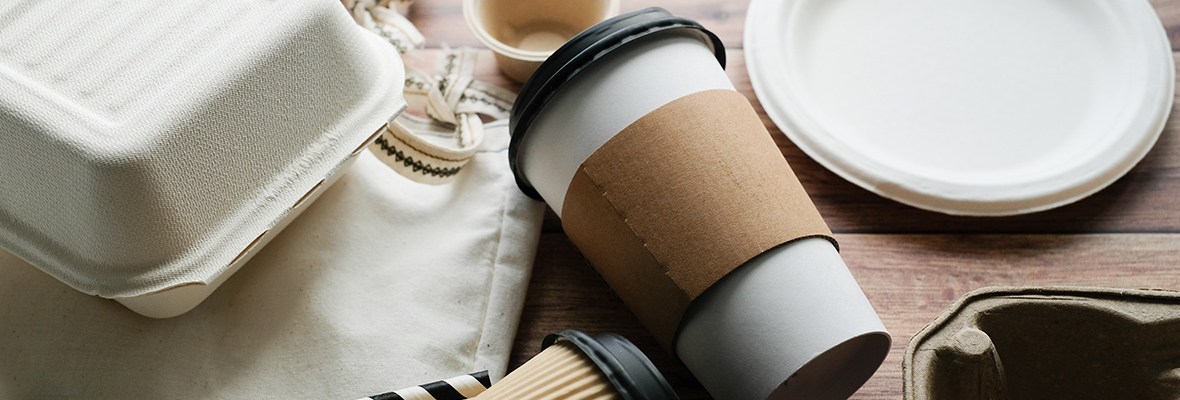
In recent years, an increase in waste, including plastic waste and vast amounts of textile waste, has been a problem.
Our company offers raw materials that utilize biodegradable raw materials, recycled and reused raw materials, and waste materials, and we are contributing to the realization of circulation-type production activities through the reduction of waste.
These plastics are completely decomposed into water and carbon dioxide through the actions of microorganisms in soil and the ocean.
This is a resin made from recovered and recycled resources. We are promoting the recycling of plastics.
For this nylon, discarded fabrics and products are collected, melted, and reused.
For these textiles, products of natural materials such as wool and feathers are collected and then reused after washing and re-spinning. Chemical-fiber fabrics such as nylon and polyester are returned to their original raw materials and then reused.
This is a material made by extracting oil from tea fruits that have been discarded by tea farmers and then weaving this into rayon fibers, and it has a high level of antibacterial properties. It is being used for medical institutions such as (bandages and towels), as well as for underwear and socks.
This material is extracted from the branches of European fir trees logged for different applications that were previously being discarded. It is expected to have effectiveness with regard to anti-diabetic and memory improvement.
Composites using the thermosetting epoxy resin “EzCiclo” can be broken down into fiber and resin components using the “CleaVER” decomposition solution, making them recyclable.
→ Learn more here.
A chemical-free water treatment system that leverages the sterilizing power of ozone water and micro-nano bubbles to eliminate the need for chemical additives. Ideal for cooling water systems in factory operations—especially cooling towers—this system contributes to lower maintenance and operational costs.

With many environmentally-friendly products being distributed in markets, selecting certified products that have been examined by a third party makes it possible to acquire items that are properly being managed, and enables users to use items with peace of mind.
Our company offers certified raw materials in fields such as textiles and cosmetic raw materials, and provides opportunities for the realization of SDG 12 “Ensure sustainable consumption and production patterns.”
We have acquired Bluesign certification regarding environmental load reduction, work-environment management, and non-use of toxic substances.
We contribute to forest protection by handling cellulose fibers that have received forest certification.
We contribute to the protection of tropical forests by handling cosmetic raw materials that have been certified by the Roundtable on Sustainable Palm Oil (RSPO).
SOALON is made from pulp sourced from natural wood certified by forest management standards, and our manufacturing facility holds FSC® CoC certification. In addition, under strict management that considers both the environment and workers — including proper treatment, recovery, and reuse of organic solvents used in the production process — SOALON has obtained bluesign® APPROVED certification.
We import products that have received “Fair for Life” fair-trade certification.

The water that we ordinarily use is gradually being polluted by industrial wastewater that is generated during production activities. As such, our company has been contributing to the achievement of SDG 6 “Ensure availability and sustainable management of water and sanitation for all” by handling fibers that can be colored without “dyeing,” which uses large amounts of water during textile-production processes, and cleaning agents that are friendly to people and the environment since they do not utilize detergents and are able to clean simply with “water.”
We contribute to reducing the volume of sewage drainage of dyeing factories by handling spun-dyed nylon that has been spun with color chips.
We offer super alkaline-ionized water that does not utilize synthetic detergents and is able to clean simply with “water.”

Automobiles emit greenhouse gases, which are a cause of global warming. Our company has been developing businesses that are aimed at reducing environmental load in this regard.
We offer machines, technologies, and testing methods for producing parts that reduce the weight of electric, fuel-cell, and gasoline vehicles while ensuring safety so that such vehicles can run more cleanly and for longer distances. Furthermore, we have been promoting the research & development of fuel cells, which are key parts in fuel-cell vehicles, and thus have been contributing to the achievement of SDG 7 “Ensure access to affordable, reliable, sustainable and modern energy for all” and SDG 13 “Take urgent action to combat climate change and its impacts.”
The cup-stacked carbon nanotube (CSCNT) product, “Carbere®,” is a revolutionary material that enables weight reduction, low friction, and wear resistance across a wide range of applications. By utilizing this material to drastically reduce the enormous energy consumption caused by friction and wear from movement and mechanical drive, we aim to achieve ultimate energy efficiency.
We handle products such as composite-material press-molding related equipment that is in line with the trend of automobile weight reduction in Japan.
OPV (Organic Photovoltaics) is a next-generation solar cell that uses organic semiconductors. Made from safe and reliable materials, OPVs offer a variety of outstanding features, including being ultra-lightweight, flexible, and light-transmissive. These characteristics enable applications that were difficult to achieve with conventional silicon solar cells, such as integration into windows of high-rise buildings and commercial facilities. As an urban power generation device, OPVs contribute to the realization of a sustainable society.
Inquiries: Nanotechnology Development Department, e-mail.:nano@gsi.co.jp , tel.: 044-322-5595


